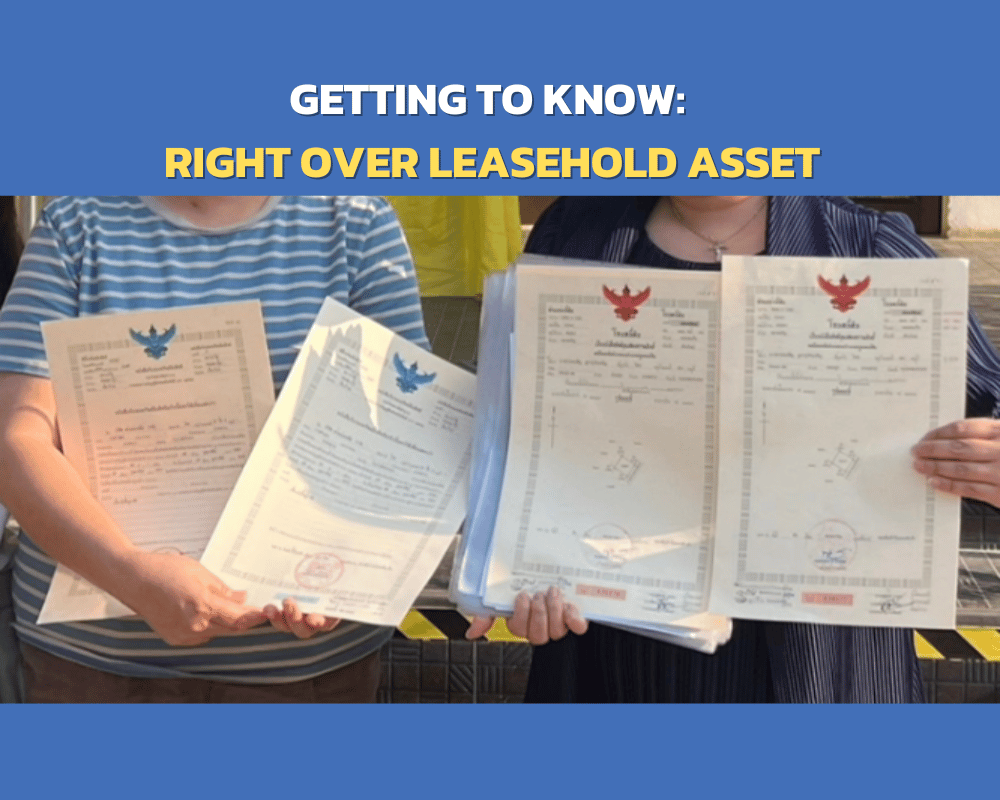Getting to Know: “Right Over Lease Hold Asset.”
A “Right Over Leasehold Asset” is essentially a substitute document for a land title deed or a condominium unit title document, issued to allow foreign ownership. This is referred to as the “Right Over Leasehold Asset Certificate” (as depicted in the attached post: the actual title deed bears a red Garuda emblem, while the “Right Over Leasehold Asset Certificate” bears a blue Garuda emblem).
This certificate serves almost all the functions of a traditional title deed, including applying for construction permits, being used as collateral for loans, buying and selling, transferring ownership, and being inherited by the heirs of the “Right Over Leasehold Asset Certificate” holder. The key additional benefit is that “foreigners can own it,” without the restrictions typically associated with land title deeds or condominium unit title documents (which are subject to a 49% foreign ownership quota).
Meanwhile, the “land title deed or condominium unit title document” being substituted by this certificate is rendered inactive, unable to undergo any legal acts or incur any additional encumbrances for the duration of the established right (currently, a maximum of 30 years considered to add more).
The Origin of “Right Over Leasehold Asset”
The concept of “Right Over Leasehold Asset” stems from a uniquely Thai legal innovation. The government wanted to attract foreign investment in real estate but was wary of criticism under the rhetoric of “selling the country.” Additionally, amending existing laws to allow foreigners to own land or lease it for more than 30 years would require extensive changes to numerous laws, including the Land Code, Civil and Commercial Code, and previous Cabinet resolutions.
Thus, a new solution was devised: “create a new type of property and right altogether.” This new right has its own specific legislation, independent of land ownership or leasehold rights under the Civil and Commercial Code. It circumvents various restrictions, such as prohibiting foreign land ownership, the personal nature of leasehold rights (which cannot be inherited unless the contract specifies “sublease rights”), and the requirement that long-term leases should be for commercial purposes (yes, you read that correctly—therefore, foreigners registering long-term leases for “residential purposes” may be subject to the discretion of land office officials, especially in strictly monitored areas, causing difficulties for brokers and agents).
This new right also addresses the need to find Thai nationals to act as nominees for shares or ownership, solving issues related to foreign nominees and old tricks of registering companies and finding Thai nominees to hold shares on behalf of foreigners.
What Assets can the RIGHT OVER (LEASEHOLD) ASSET be established ?
The establishment of the RIGHT OVER (LEASEHOLD) ASSET can be activated with the immovable property
1) land that has title deed
2) land with structure in land that has title deed
3) strata title condominium unit under the law on condominium (section 3)
How is the RIGHT OVER (LEASEHOLD) ASSET better and more secure than “30-Year Lease Contract”?
1) Upon establishing the RIGHT OVER (LEASEHOLD) ASSET, “the certificate of rights over leasehold asset” will be issued to the foreigner, holder. Its function is almost equal to the title deed or strata title (the document of condo ownership—”Aor”Chor 2” in Thai) as the case may be. Whereas, there is no any such thing in case of “Long-term contract.
2) Right Over Leasehold Asset is Transferable: Unlike a lease agreement, which is personal to the lessee, a Right Over Leasehold Asset can be transferred to another person. This transferability enhances its value and flexibility as an asset.
3) Right Over Leasehold Asset as Collateral: A Right Over Leasehold Asset can be used as collateral for loans or other financial obligations. This provides the holder with greater access to financing options.
4) Right Over Leasehold Asset as Inheritance: Upon the death of the holder, a Right Over Leasehold Asset can be passed on as part of their inheritance. This ensures the continued enjoyment of the property rights by their successors.
5) A holder of RIGHT OVER (LEASEHOLD) ASSET has right to utilize immovable property. (Section 10) There is no need for the permission of the property owner in official business, ex. applying the building permit, asking for electricity & water meter, doing the plantation, etc.
6) When establishment of the RIGHT OVER (LEASEHOLD) ASSET in any immovable property, owner of immovable property cannot establish any proprietary interest in such immovable property except receiving written consent from the holder of rights over leasehold asset. (Section 9)
For more information : How to Invest – Buy – Own the Thai house, Condo, Villa, Apartment, Property & Business, Real Estate Investment in Thailand ![]()
Please contact us for Free Consultation for the first time*
Mobile Phone : 0803155686
WhatsApp : http://wa.me/+66969566936 (English Speaking)
Line ID : @housecondolawyer
FB Inbox : http://m.me/housecondolawyer
E-mail : housecondolawyer@gmail.com
Web : www.housecondolawyer.com


